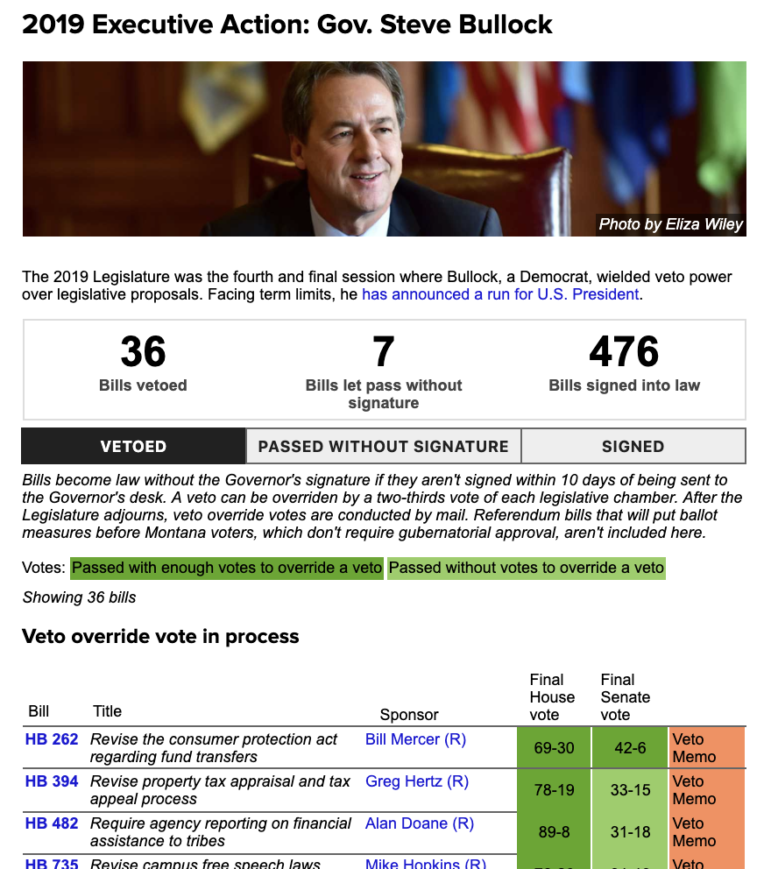HELENA — Montana lawmakers sent 519 bills to the desk of Gov. Steve Bullock over the course of the 2019 legislative session. The vast majority, 476, the governor signed into law.
But Bullock, a Democrat who announced a run for the U.S. presidency May 14, used his veto pen to block 36 Republican-sponsored bills, including an effort to reduce prescription drug prices (Senate Bill 71) and an anti-abortion measure (House Bill 500). He also vetoed bills that would have exempted some Social Security benefits from state income taxes (Senate Bill 217) and given telecom companies property-tax breaks in an effort to promote rural broadband development (Senate Bill 239).
The governor also allowed seven measures to become law without his signature, letting his 10-day deadline to either sign or veto them expire. Among that number were measures requiring the state health department to share data with legislative analysts (House Bill 433) and preventing homeowner associations from adding new covenants without property owner consent (SB 300).
Legislators can override vetoes with two-thirds majority votes in both chambers. With the legislative branch’s present composition, a 58-42 split between Republicans and Democrats in the House and a 30-20 split in the Senate, reaching that threshold takes support from lawmakers in both parties.
Veto override votes, conducted by mail with the Legislature adjourned, are pending for eight measures, including the prescription drug pricing and broadband property tax measures, both of which passed the Legislature with enough support to override a gubernatorial veto. Those votes will conclude in mid-June.
Here’s how Bullock has explained four key vetoes. For a complete list, including links to veto memos for each measure, see the governor’s page on the MTFP legislative tracking app:
SB 71: Regulate health insurers’ administration of pharmacy benefits for consumers
Sponsored by Sen. Al Olszewski, R-Kalispell, and backed by the state auditor’s office, SB 71 would reduce drug prices by regulating pharmacy benefit managers, who serve as middlemen between pharmacies and drug manufacturers. State Auditor Matt Rosendale, a Republican, has accused benefit managers of “price gouging.”
In his veto memo, Bullock argues the additional regulation would limit consumer choice and increase health-care costs, calling it “likely to do just the opposite of what the sponsor intends.”
HB 500: The Montana Pain-Capable Unborn Child Protection Act
HB 500 would have made it illegal to perform an abortion in Montana more than 20 weeks into a pregnancy, with the exception of situations involving a “serious health risk” to the mother. It was sponsored by Rep. Lola Sheldon-Galloway, R-Great Falls.
Bullock’s veto memo cites a state Supreme Court ruling that the right of privacy enshrined in the Montana Constitution “guarantees each individual the right to make medical judgments affecting her or his bodily integrity and health in partnership with a chosen health care provider free from government interference.”
SB 217: Revise taxation of Social Security income
Sponsored by Sen. David Howard, R-Park City, SB 217 would have lowered the tax burden on Montana seniors by letting them exempt a greater share of their Social Security benefits from state income taxes.
In his veto memo, Bullock points to the cost of the tax cut, $36 million over the next two years, and argues the cut would “disproportionately benefit seniors with higher incomes,” despite it having been pitched as a way to help retirees living on fixed incomes.
SB 239: Moratorium on property taxes for broadband fiber and cable
Sponsored by Sen. Jason Ellsworth, R-Hamilton, SB 239 would encourage telecom providers to invest in expanding broadband networks to rural areas by reducing property taxes for 10 years on new fiber optic and coaxial cable lines. It is backed by a number of telecommunications companies, which told lawmakers that existing federal subsidies for broadband deployment aren’t adequate to bring service to remote parts of the state.
In his veto memo, Bullock argues the bill “creates a tax break for corporations to do things they’re already doing” and says a majority of its estimated $3.1 million subsidy would “go to large multi-state corporations deploying fiber optic and coaxial cable in cities.”


